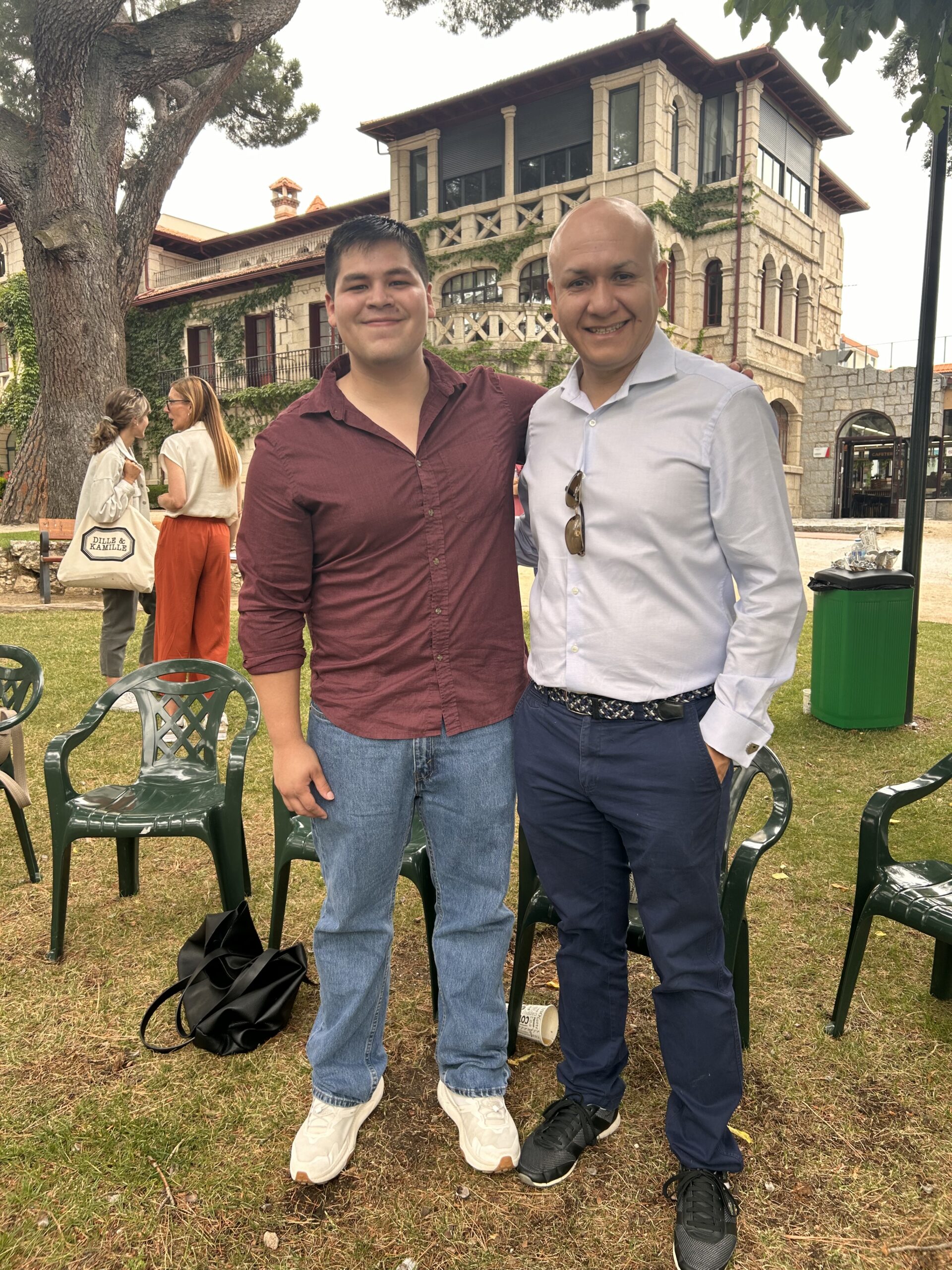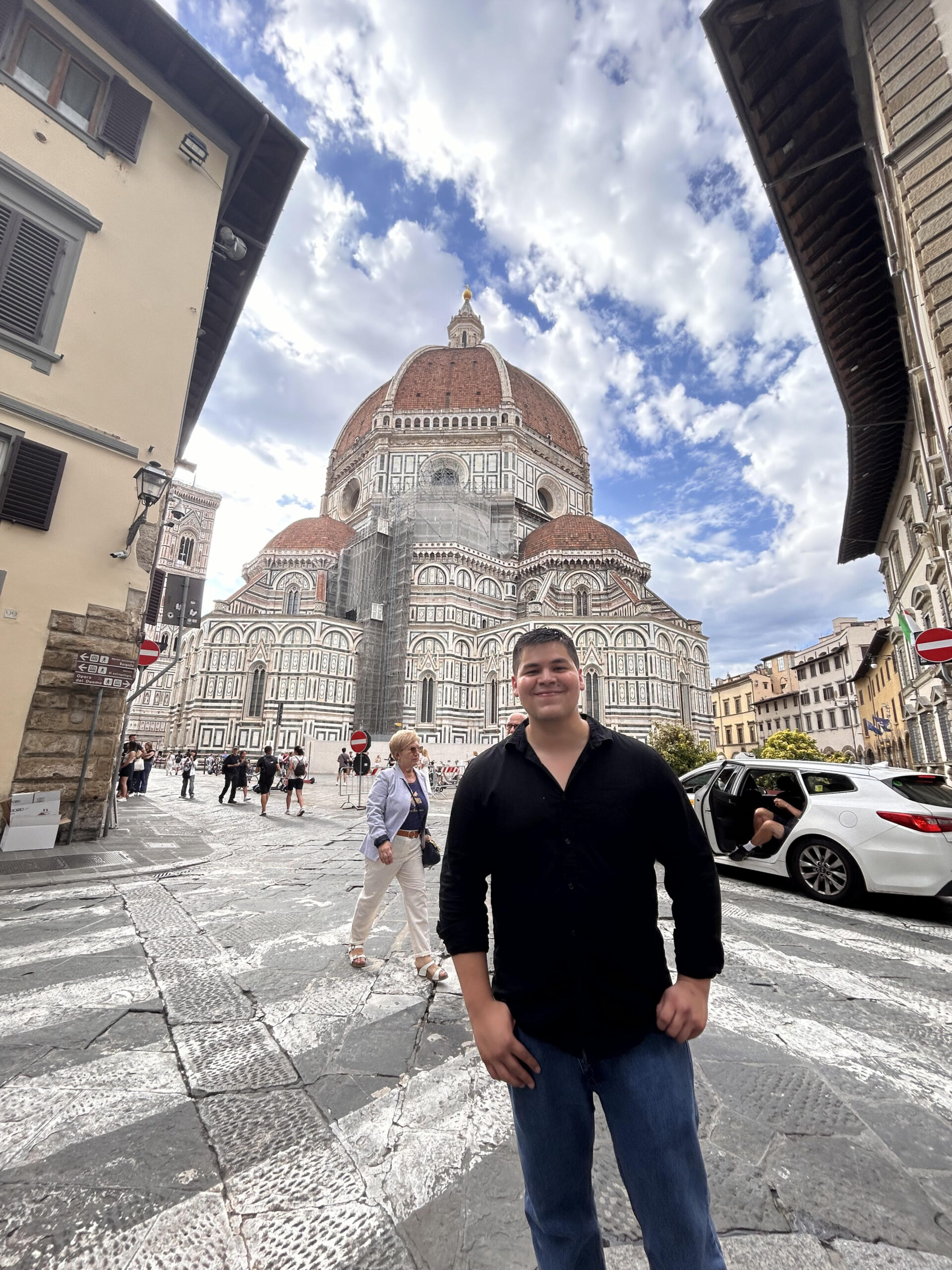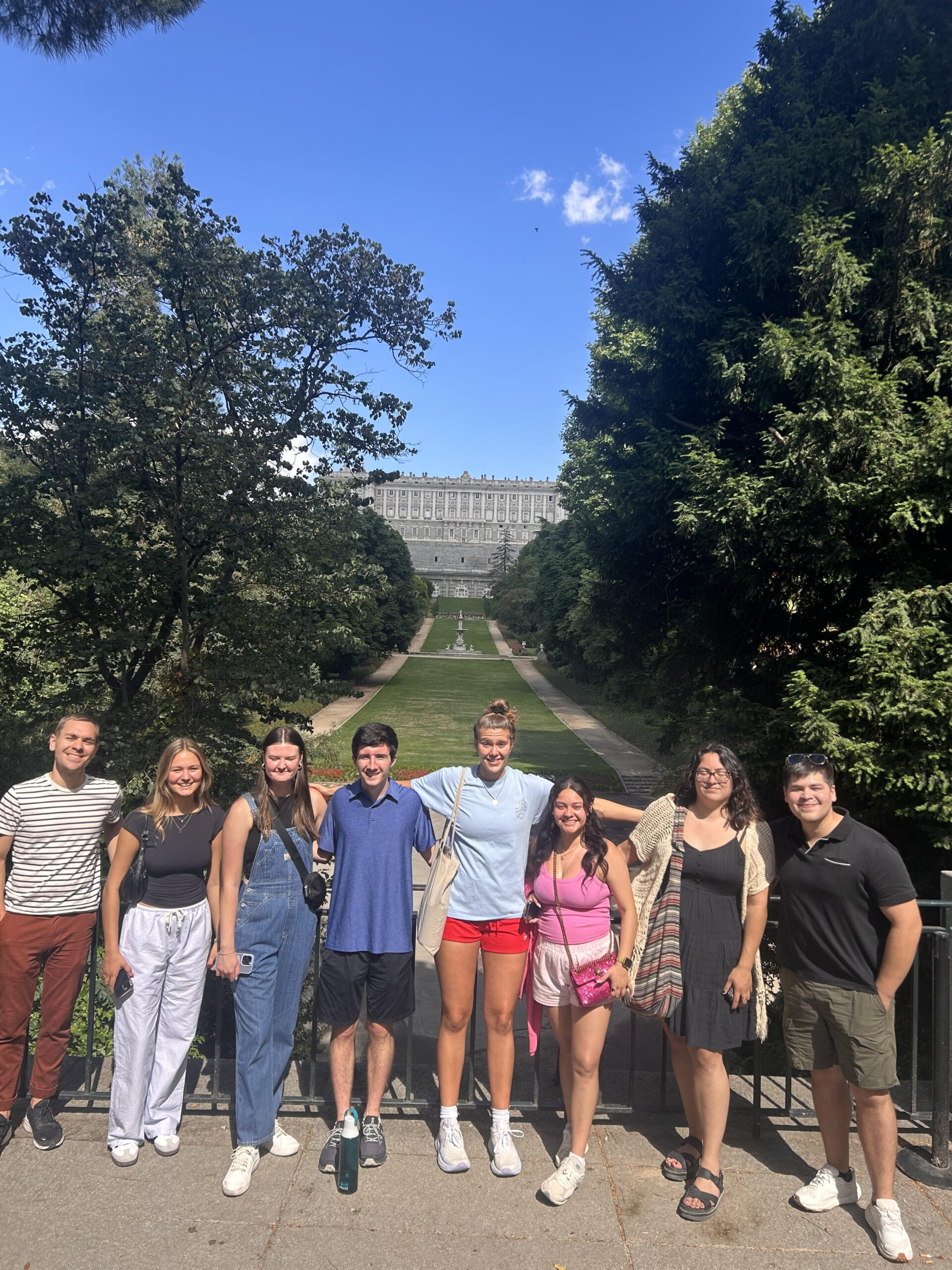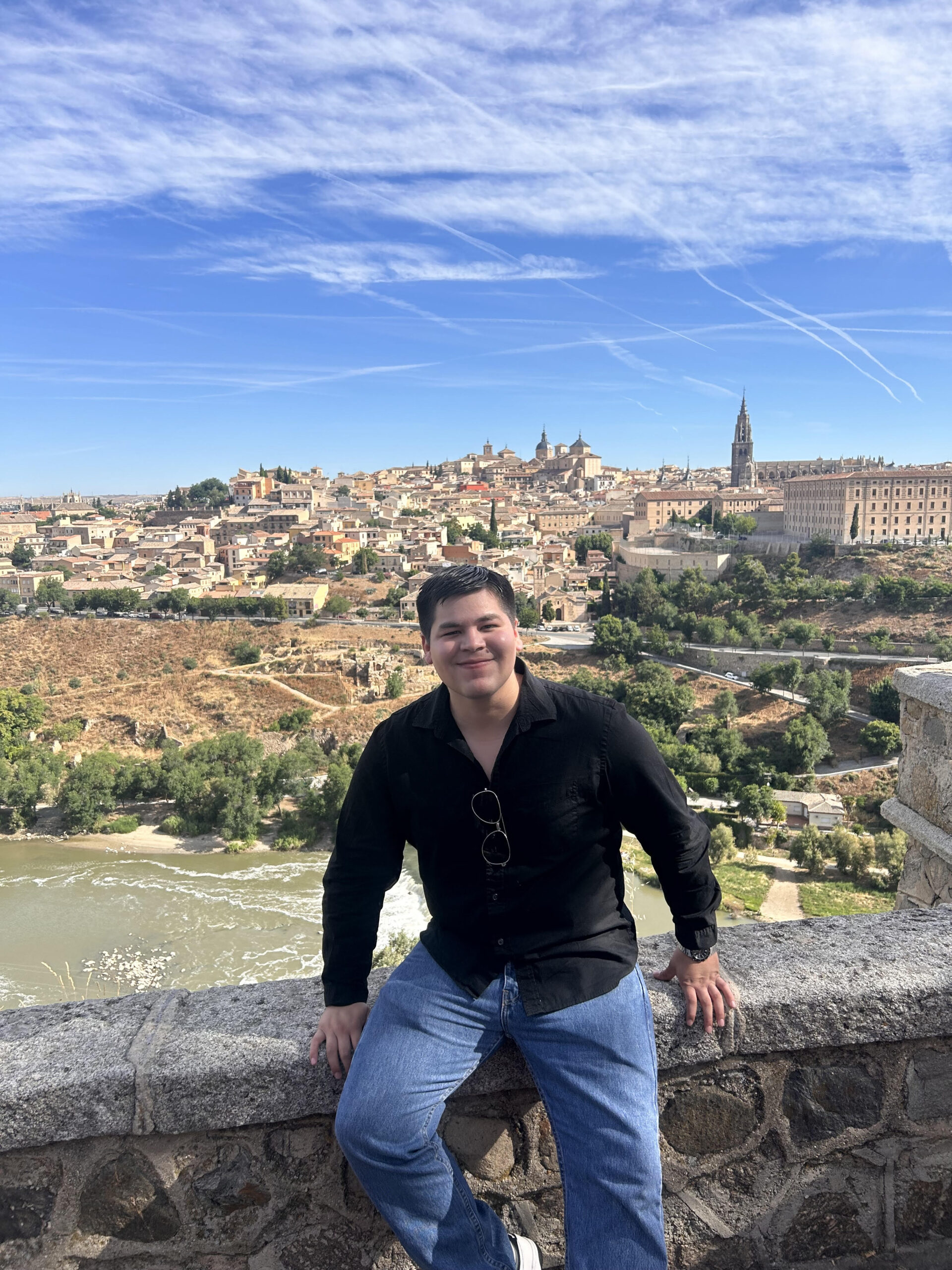
8
Eager to step into the footsteps of a college student who is experiencing life in Madrid? We recently caught up with AIFS Abroad student Sebastian from Texas A&M International University. He spent his summer break studying abroad in the capital city of Madrid on our program at Universidad de Nebrija.
Read on to learn more about his study abroad experience with AIFS Abroad and the impact of being an international student in Madrid.
Lexi: Hi, everyone. My name is Lexi and welcome back today. I’m here with Sebastian. When I studied abroad back in fall of 2022, I went to Maynooth University in Maynooth, Ireland. Sebastian is going to be my guest today. So why don’t you tell us a little bit about who you are and where you studied abroad, Sebastian?
Sebastian: Hello, everyone. My name is Sebastian. I studied abroad at Universidad de Nebrija on the Estudios Hispanicos program in Madrid. I studied abroad for one month. It was such a great experience. My first language is Spanish. I had a great time with people from Spain. I learned a lot about their culture. I go to Texas A&M International University. My university is immersed a lot into Hispanic culture since we have a lot of different cultures from Latin America. And I’m just here to talk about my experience.

Lexi: Amazing. Yeah, so thinking back to before you went and studied abroad, was there kind of like a defining moment where you definitely decided that this is what you wanted to do, you wanted to study abroad and how did that feel to you?
Sebastian: At the beginning, I had so much fear to study abroad – going to a different country and the expenses. I was not sure if I was going to be able to do that. I was just scared, but I was helped by an AIFS ambassador in my institution. She helped me to go review the scholarships, the programs, the costs, and everything and after careful consideration, I chose Madrid, Spain. I think it was the best decision that I could have ever made. The defining moment when I decided to study abroad was when I talked to students who had studied abroad in my university. We receive a lot of students from different institutions in the world and just to talk to them and hear about their experience, how it has changed them both personally and in a professional sense… it motivated me to proceed and just do it.
Lexi: Yeah, there’s always that moment of when you have the realization that you’re going and it is pretty scary to make that big jump and that big commitment but once you go through with it, it definitely pays off.
Sebastian: Yeah, definitely. I think it is something that I would recommend to everyone just to study abroad and even more with AIFS. I think the staff from AIFS is really helpful, not just in the academic sense, but also in the way they help you immerse yourself in a different culture, present you with different opportunities, and at the same time, help you connect with other people.
Lexi: Yes, definitely. I totally agree. Especially through AIFS, there’s a lot of different options that not all kinds of study abroad programs can offer… with excursions, and the ambassadors, and everything that goes with you while you are there to kind of help you feel comfortable in your new environment. I definitely think that one of the biggest benefits of AIFS is having that group with you, as you’re going around the country.

Lexi: So, did you notice in Spain, was there any kind of focus on fighting climate change or green initiatives while you were there?
Sebastian: One of the initiatives that I noticed most is the bins containers. They would have containers to recycle the different stuff you would use in a daily basis. That’s something that really impacted me because I’m from Southwest Texas where I do not see that very often. It’s pretty much you take out the trash. That’s pretty much it. Just looking at how they try to maintain their environment. For example, these (holds up bottle cap) would be connected to the bottle. I think it’s great what they do in Spain. I think there’s something that we should do in the US. One of the things that amazed me the most, one of the things I liked the most is that they drink tap water. So just how safe it is to drink tap water when you go to a restaurant, you don’t have to pay for a bottle of water or anything like that.
Lexi: Yeah, that is another thing that stood out to me was the bottle caps being a part of the, the cup itself. Yeah, when I first tried to get it off, I was like, wait, why is it not coming off? And then I realized it’s actually attached to it. And then when I finally came back to the United States, I was like, oh, wow, I can actually take the whole thing off. This is crazy.
Sebastian: Yeah, it’s crazy. I think we should do that in the U.S. I think it’s really helpful for the environment. From where I’m from they usually collect them and whenever you collect so many, they pay for cancer treatments for people.
Lexi: Oh, wow, that’s amazing.
Sebastian: So, I think just by taking care of the environment, if we all come together and take care of the environment, I think it’s a great thing. Not only for us as a population, but also for animals, people, the world in general.
Lexi: Yeah, definitely. Yeah, I totally agree. I think that there’s so many benefits to it that I wish that America was a little bit better on the whole recycling aspect. Yeah, so how did you feel being abroad in your own kind of identity? Did you kind of feel like there was any culture shock when you first went abroad or was it kind of an easier transition?
Sebastian: I definitely had a lot of culture shocks. When I went to Spain, I took International Management course, and in this course, we would learn about different cultures. So they taught us how to interpret Spanish culture and other cultures of the world.
I think it’s really interesting for me. I was raised in Mexico. Then later, after 12 years, I went and lived in the U.S. in Texas. I’m 20 years old. And just being immersed in two different cultures between Mexico and the U.S., which are really different, and going to another culture, I even have culture shocks from the U.S. So, I’ve had culture shocks from the U. S., I’ve had culture shocks from Spanish culture, and when I came back, I had culture shocks from both, from Mexico and the U. S. It’s really interesting. That’s one of the reasons that I would recommend everyone just to study abroad, because you’ll understand yourself more than you do before. And I think it is something that has benefited me a lot, just to have this perspective of things.
Lexi: Yeah, you really don’t kind of understand how different each place in the world is until you’re able to actually go and experience it. And yeah, I totally agree. I think everybody should be able to study abroad if they can and be able to see firsthand what it’s like outside of the country that they’re from.
Sebastian: Also, I met a lot of people from different Latin American countries. I had culture shocks with different cultures from Latin American countries. It’s really interesting how, even though we’re all different, we all share some similarities and just learning from them, I think it connects us very much.

Lexi: How did you adapt to Spain’s Spanish-speaking environment?
Sebastian: Yes, even when I first arrived, I had a lot of difficulties to talk to people from Spain. We all speak the same language, but we of course have different accents and different terms. For example, when I first arrived, I asked for a cafe americano. And they gave me an espresso. I’m not sure why. Maybe they were in a hurry. Yeah, it was interesting to see. I traveled around four cities in Spain. One of the cities that I had the most difficulty to talk to people was in Seville. They talk very fast in Spanish so it was difficult to talk to them, but it was great just to, to have that experience during my study abroad, just because of the way that I can now see the world, how the Spanish Language is so big around the world. It’s not just with Spanish people, I would also have difficulty to talk to people from Colombia or people from Venezuela. But it’s something that I would encourage English speakers because since you’re not just learning about Spain, you are actually learning about people from other countries that are arriving to Spain. So, I think it’s a great opportunity.
Lexi: Yeah, it’s always like no matter where you go, even if it is the same language, there’s different accents or different slang terms that you have to learn and adapt to as you are there. So even if you go to a place where you speak the language, you might still be learning some new stuff while you are there which is pretty cool.
Sebastian: And also to be respectful to them, because for example, although I have a vocabulary, it’s different from people’s vocabulary that is used in Spain. I tried to learn the words in Spain because I wanted to be respectful and also because I do not want to use words that may mean something else. So, I just adapted into it.
Lexi: Yeah, definitely. Yeah. I think that that’s great going to another country and just trying to be respectful and just learning and adapting to the way that things are over there, for sure. So, thinking back again to before you went, kind of right before you were going, packing, was there anything kind of specific that you wish you had packed that you hadn’t, or anything that you did pack that you were like, oh, I guess I didn’t really need this.
Sebastian: Honestly, during my orientation with AIFS from my university, it was recommended to me to not take a lot of stuff, which I appreciate very, very much. For anyone that is studying abroad, I would recommend not taking as much. There’s washing machines, there’s dryers, yeah, wash your clothes. And one of the reasons that I would recommend that is because we can buy a lot of stuff in the other country and also bring so much stuff back. For example, in Spain, they have a store, it’s called Primark. It’s so cheap. For example, some shorts, a shirt or maybe some sandals – everything costs five euros. It’s pretty cheap. So I would recommend that. Also, I have friends that have studied in Italy or in South Korea. It’s really cheap. They come back to the U.S., and they even have a different style of how they dress. So, I would encourage people not to take a lot of stuff – once you get into a study abroad location, just buy everything there.
Lexi: I hundred percent agree. Yeah, you’re going to end up I feel like a lot of the times buying stuff there just getting stuff just from living there, you’re going to need some things or see anything you want. Make sure you have enough space to be able to bring it back with you. In most cases, under packing is the way to go because you can always go out and buy stuff when you’re there. If you overpack, then you got to maybe get rid of some stuff, which you might not want to do.
Sebastian: Yes, I had a friend who took a lot of stuff. She took two luggages and she pretty much left one luggage in Sweden to take one back. And she even purchased another one to take back. So yeah, I just thought, you know, don’t take that much stuff.

Lexi: So, I have one last question for you. What is a piece of advice that you would give someone who’s thinking about studying abroad?
Sebastian: I think it’s just not to think about it that much. It’s about just about doing it. At first, as I said in the beginning, I was thinking too much, I was worried about the financials, about how everything was going to happen, about how it can be. It can be quite expensive, but just by taking a step, I was able to get a scholarship from AIFS. And AIFS is a program that I really appreciate. The people from AIFS, I really appreciate them just in the sense of how they helped me. And it’s a program that I would recommend.
Lexi: There are so many different sources that you can go through on our website or talk to people through our website and different ways you can kind of get more information. There are so many different opportunities for scholarships and just to learn more about the programs in general to find whatever works best for you. If you’re interested in studying abroad, there’s so many different places you can go, programs you can do, times of the year you can go. Also, there’s something for everybody, which, yeah, I think is really great about this specific program.
Sebastian: For sure. And also, that they have the opportunity, as you may know, to intern abroad, which is something great. I met a lot of people from AIFS. They were interning abroad. They will talk about their experience, how these employers are providing the opportunity to be involved in the work. They are in a different country, and I think it opens so many doors to people.
Lexi: Oh yeah, interning abroad I think is one of the best parts of this program because, like you said, it opens so many doors, it gives you the chance to actually learn what it’s like to work in another country if that’s what you want to do. And I think it’s a great, like, baseline for people who are really seriously interested in doing that.
Sebastian: Definitely, yes. For everyone that is watching, take the first step. If I was able to do it, if so many people have been able to do it, just take the first step.
Lexi: Thank you so much, Sebastian, for all your insight and all your advice. It was very, very helpful for everybody tuning in, I am sure.
Sebastian: Thank you for inviting me to this. It was great to be in this meeting.
Lexi: Amazing. Yeah well, thank you again, and thank you everybody for watching and tuning in. Thank you.
Are you a student who’s ready to take the leap and study abroad on a summer program in Madrid like Sebastian did with AIFS Abroad? We’d love to help you start your journey!
Here at AIFS Abroad, we know a thing or two about helping college students and pre-professionals study and intern abroad. Our programs are incredibly inclusive, which takes a lot of the stress out of planning. From coordinating your housing to providing things like cultural and social activities, excursions, comprehensive insurance, 24/7 emergency support, on-site staff, and more, you’ll take comfort in knowing you’ll have support throughout your entire experience abroad.